De Amerikaanse schrijver Robert Ludlum werd geboren in New York op 25 mei 1927. Zie ook alle tags voor Robert Ludlum op dit blog.
Uit: The Janson Directive
“N. Indian Ocean, 250 miles east of Sri Lanka
Northwestern Anura
The night was oppressive, the air at body temperature and almost motionless. Earlier in the evening there had been light, cooling rains, but now everything seemed to radiate heat, even the silvery half-moon, its countenance brushed with the occasional wisps of cloud. The jungle itself seemed to exhale the hot, moist breath of a predator lying in wait.
Shyam shifted restlessly in his canvas chair. It was, he knew, a fairly ordinary night on the island of Anura for this time of year: early in the monsoon season, the air was always heavy with a sense of foreboding. Yet only the ever attentive mosquitoes disturbed the quiet. At half past one in the morning, Shyam reckoned he had been on checkpoint duty for four and a half hours. In that time, precisely seven motorists had come their way. The checkpoint consisted of two parallel lines of barbed-wire frames–“knife rests”–set up eighty feet apart on the road, to either side of the search and administration area. Shyam and Arjun were the two sentries on forward duty, and they sat in front of the wooden roadside booth. A pair of backups was supposedly on duty on the other side of the hill, but the hours of silence from them suggested that they were dozing, along with the men in the makeshift barracks a few hundred feet down the road. For all the dire warnings of their superiors, these had been days and nights of unrelieved boredom. The northwestern province of Kenna was sparsely populated in the best of times, and these were not the best of times.
Now, drifting in with the breeze, as faint as a distant insect drone, came the sound of a gunned motor.
Shyam slowly got to his feet. The sound was growing closer.
“Arjun,” he called out in a singsong tone. “Ar-jun. Car coming.”
Arjun lolled his head in a circle, working out a crick in his neck. “At this hour?” He rubbed his eyes. The humidity made the sweat lie heavily on his skin, like mineral oil.
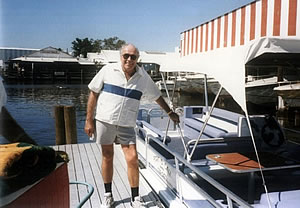
Robert Ludlum (25 mei 1927 – 12 maart 2001)
De Amerikaanse dichter Theodore HuebnerRoethke werd geboren in Saginaw, Michigan op 25 mei 1908. Zie ook alle tags voor Theodore Roethke op dit blog.
Once More, the Round
What’s greater, Pebble or Pond?
What can be known? The Unknown.
My true self runs toward a Hill
More! O More! visible.
Now I adore my life
With the Bird, the abiding Leaf,
With the Fish, the questing Snail,
And the Eye altering All;
And I dance with William Blake
For love, for Love’s sake;
And everything comes to One,
As we dance on, dance on, dance on.
The Bat
By day the bat is cousin to the mouse.
He likes the attic of an aging house.
His fingers make a hat about his head.
His pulse beat is so slow we think him dead.
He loops in crazy figures half the night
Among the trees that face the corner light.
But when he brushes up against a screen,
We are afraid of what our eyes have seen:
For something is amiss or out of place
When mice with wings can wear a human face.
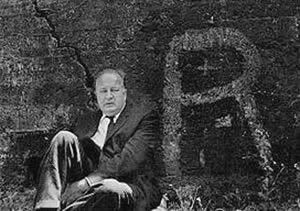
Theodore Roethke (25 mei 1908 – 1 augustus 1963)
De Franse schrijver en historicus Georges Bordonove werd geboren in Enghien-les-Bains op 25 mei 1920. Zie ook alle tags voor Georges Bordonove op dit blog.
Uit: Chien de feu
“Sais-tu, loup, que nous sommes pareils ? Nous appartenons à une race révolue, une race qui doit disparaître. La terre donne une nouvelle floraison, d’autres bêtes, d’autres hommes que nous. Il ne doit plus y avoir de seigneurs bardés de fer derrière leurs créneaux, ni de loups hurlant dans leurs bois. Cela fait partie d’un passé déjà mort. Nous nous survivons, toi et moi ; c’est dire que nous sommes condamnés. Mais quelle importance ? Nous avons eu nos vies, nos plaisirs. Nous avons cru que cela devait durer toujours. Tes pairs, dans les années qui s’annoncent, périront par le poison. Les miens, par la ruine. C’est chose douce que de comprendre ! Ainsi, tu vois, vieux loup, nous nous affronterons, parce que ce sera dans notre rôle. Je t’attaquerai, tu te défendras, tu feras front et je te daguerai. Et puis… Mais est-ce qu’on empêche l’eau de couler ? Est-ce qu’on arrête la marche des saisons ? Je suis content que ce soit toi, car tu es brave et d’expérience. Que les autres ne soient point venus à bout de ta malice ! Tu m’attendais. Il y a entre nous un pacte, une convenance. Eh bien, si tu veux, que cela soit, et jouons le jeu.”
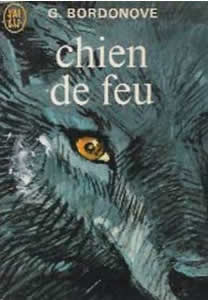
Georges Bordonove (25 mei 1920 – 16 maart 2007)
Cover
De Canadese schrijver William Patrick Kinsella werd geboren op 25 mei 1935 in Edmonton, Alberta. Zie ook alle tags voor W. P. Kinsella op dit blog.
Uit:Shoeless Joe
“Annie: She has never once called me crazy. Just before I started the first landscape work, as I stood looking out at the lawn and the cornfield, wondering how it could look so different in daylight, considering the notion of accepting it all as a dream and abandoning it, Annie appeared at my side and her arm circled my waist. She leaned against me and looked up, cocking her head like one of the red squirrels that scamper along the power lines from the highway to the house. “Do it, love,” she said as I looked down at her, that slip of a girl with hair the color of cayenne pepper and at least a million freckles on her face and arms, that girl who lives in blue jeans and T-shirts and at twenty-four could still pass for sixteen.
I thought back to when I first knew her. I came to Iowa to study. She was the child of my landlady. I heard her one afternoon outside my window as she told her girl friends, “When I grow up I’m going to marry . . .” and she named me. The others were going to be nurses, teachers, pilots, or movie stars, but Annie chose me as her occupation. Eight years later we were married. I chose willingly, lovingly, to stay in Iowa. Eventually I rented this farm, then bought it, operating it one inch from bankruptcy. I don’t seem meant to farm, but I want to be close to this precious land, for Annie and me to be able to say, “This is ours.”
Now I stand ready to cut into the cornfield, to chisel away a piece of our livelihood to use as dream currency, and Annie says, “Oh, love, if it makes you happy you should do it.” I carry her words in the back of my mind, stored the way a maiden aunt might wrap a brooch, a remembrance of a longlost love. I understand how hard that was for her to say and how it got harder as the project advanced. How she must have told her family not to ask me about the baseball field I was building, because they stared at me dumb-eyed, a row of silent, thickset peasants with red faces. Not an imagination among them except to forecast the wrath of God that will fall on the heads of pagans such as I. “
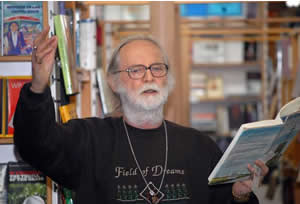
W. P. Kinsella (Edmonton, 25 mei 1935)
De Duitse schrijver Max von der Grün werd geboren op 25 mei 1926 in Bayreuth. Zie ook alle tags voor Max von der Grün op dit blog.
Uit: Wie war das eigentlich?
„Der vom Fähnleinführer niedergeschlagene Junge fragte unseren Lehrer, warum in unserer Schule gelehrt würde, daß es Unterdrückung sei, wenn man den Hut des Herrn Geßler grüßen müsse, und wollte wissen, warum man niedergeschlagen würde, wenn man die Fahne nicht grüße, schließlich sei es doch dasselbe.
Wir saßen alle mucksmäuschenstill. Wir warteten auf Antwort, aber unser Lehrer sagte nur: »Bestelle deinem Vater, er soll sich morgen Mittag beim Rektor melden.«
Ich habe nie erfahren, was bei der Unterredung herauskam. Mein Schulkamerad schwieg hartnäckig, wenn wir ihn darauf ansprachen und als ich einmal merkte, wie er heimlich weinte, hörten wir mit den Fragen auf.
Es wurde darüber getuschelt, der Rektor habe dem Vater gedroht, daß er ihn wegen Verunglimpfung hoheitlicher Symbole anzeigen werde, wenn er weiterhin darauf bestehen würde, für seinen Sohn Genugtuung zu fordern.
Daß es sogar lebensgefährlich war, die Hakenkreuzfahne nicht zu grüßen, beweist der Fall des evangelischen Pfarrers Paul Schneider.“
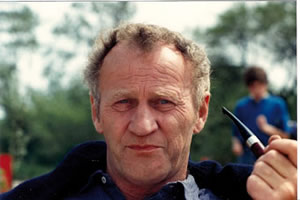
Max von der Grün (25 mei 1926 – 7 april 2005)
De Amerikaanse schrijver en journalist John Gregory Dunne werd geboren op 25 mei 1932 in West Hartford, Connecticut. Zie ook alle tags voor John Gregory Dunne op dit blog.
Uit: Nothing Lost
“I broke an Internet password. Read the spaces between the lines. Traced the implication of things. Guessed the unseen from the seen. Judged the whole piece by the pattern. Surmised. Triangulated. Extrapolated.
Anything that passed through my filter carries my shadows, my impri- matur. As fact, it might be suspect, but as truth it is as close as I can get. If you were the filter, your facts, or your memory of them, might be equally suspect, but the truth, presupposing your honesty, or as close as you could get to it.
But you weren’t there, and I was, so fuck off.
I think I got it right.
Mostly.
And if I didn’t, it’s the available version.
Of course it began with Edgar Parlance.
His death, and the obscene brutality of it, immediately captured the headlines and the newsbreaks of the gluttonous 24/7 news cycle, searching as always for the correct and visually gratifying metaphor to validate the American experience, or, better yet, to provide a dark parable about that same experience. It is my own feeling that life began going downhill with “You give us twenty-two minutes, we’ll give you the world.” I think I would have preferred to live in the age of the pony express, allowing as it did, I would like to think, a time for contemplation before action was deemed necessary. 24/7, plus the transitory involvement of a president looking for a way to act presidential as the second term of his forgettable administration was winding down to its unlamented conclusion, gave Edgar Parlance’s murder the push it needed to become a major media event, bringing with it the usual suspects, talking heads prattling about race hatred and the phenomenon of what they insisted on calling “Terror in the Heartland.” It was a heartland that existed only in their fevered imaginations, neighborly values and small-town ways, stoked not by reality but by Oscar Hammerstein, we know we belong to the land, and the land we belong to is grand. Crap, of course. This land was fertilized with blood. Jesse and Frank James, Bonnie Parker and Clyde Barrow, killers all, sanitized into public darlings by Tyrone Power and Henry Fonda, Warren Beatty and Faye Dunaway.”
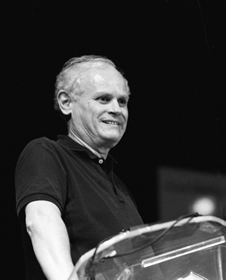
John Gregory Dunne (25 mei 1932 – 30 december 2003)
Zie voor nog meer schrijvers van de 25e mei ook mijn vorige blog van vandaag.
